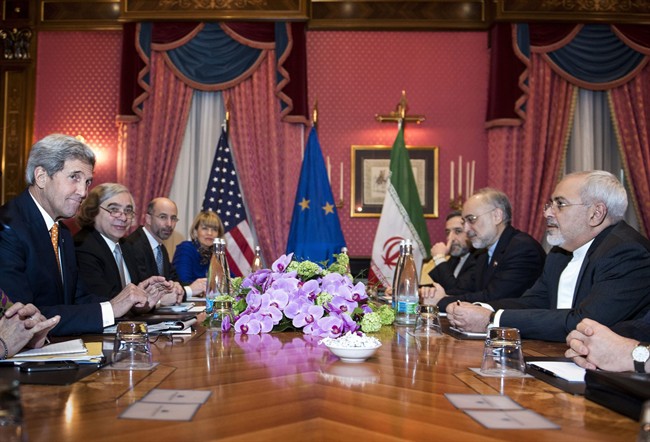LAUSANNE, Switzerland – Iran’s foreign minister sought Friday to dismiss concerns that his country’s preoccupation with the crisis in Yemen could serve as a distraction at nuclear talks with six world powers, saying the negotiations remained focused on sealing a deal.

Yemen is “the hot issue of the day” and has come up at the talks but “it doesn’t mean that we negotiated about it,” Mohammad Javad Zarif told reporters.
Saudi-led air strikes on Shiite rebels in Yemen are further straining relations between the Sunni Gulf kingdom and predominantly Shiite Iran. Zarif said they “have to stop and everybody has to encourage dialogue and national reconciliation.”
Despite Iran’s concerns over Yemen, however, “our negotiations are confined to the nuclear” issue, he said.
Zarif spoke shortly after his first meeting of the day with U.S. Secretary of State John Kerry. The sides are hoping to narrow gaps in time to reach a preliminary deal by the end of the month. That would allow them to try and negotiate a comprehensive agreement by late June to put long-term curbs on Tehran’s nuclear activities in exchange for sanctions relief.

Get breaking National news
Iran pushing for sanctions relief as soon as a pact is sealed
Iran has been pushing for full up-front sanctions relief as soon as a pact is sealed, but White House spokesman Josh Earnest said President Barack Obama thought that would be “unwise.”
“We need to see sustained long-range compliance with the agreement before we start having a conversation about removing things like the statutory sanctions that have been so critically important,” said Earnest. “There is a way for us to do this in a phased fashion over the course of time.”
Iranian officials have been upbeat recently about the chances of making enough progress by Tuesday to permit them to proceed into the summer. But Zarif was less bullish Friday, saying only that he hoped the sides would come to a common understanding by next week.
“The talks are very difficult and very complicated,” he told Iranian TV.
In Washington, British Foreign Secretary Philip Hammond said the parties were “better than half way” to a deal.
On some issues “we’re close enough that we can be sure we will reach agreement on them,” Hammond said. But on others, he added, “we are significantly apart and it’s going to require a significant move by the Iranians to reach our red line positions.”
Accord a top U.S. foreign policy priority
The Obama administration has made an accord that lessens fear about Iran’s nuclear weapons potential a top foreign policy objective. Iran denies any interest in such arms but has been drawn to the negotiating table in part by the promise of a lifting of sanctions.
Iranian President Hassan Rouhani sent a letter to Obama and the leaders of the other countries at the talks – Russia, China, Britain, France and Germany. His office said Friday the letters contained proposals on how to reach a deal, without elaborating. Rouhani also spoke to the leaders of Russia, France and Britain by phone.
Earnest confirmed that U.S officials received the letter meant for Obama, telling reporters that the president “is certainly aware of the contents” but Earnest would not disclose them.
The fate of a fortified underground bunker previously used for uranium enrichment appeared closer to resolution. Officials have told The Associated Press that the U.S. may allow Iran to run hundreds of centrifuges at the Fordo bunker in exchange for limits on centrifuge work and research and development at other sites.
Iran siite would subject to international inspections
The trade-off would allow Iran to run several hundred of the devices at the once-secret facility, although the Iranians would not be allowed to do work that could lead to an atomic bomb and the site would be subject to international inspections.
In return, Iran would be required to scale back the number of centrifuges it runs at its Nathans facility and accept other restrictions on nuclear-related work.
Instead of uranium, which can be enriched to be the fissile core of a nuclear weapon, any centrifuges permitted at Fordo would be fed elements used in medicine, industry or science, the officials said.
Even if repurposed to enrich uranium, the number of centrifuges would not be enough to produce the amount needed to produce a weapon within a year – the minimum time-frame that Washington and its negotiating partners demand.
Associated Press writers Bradley Klapper and Jim Kuhnhenn in Washington and Cara Anna at the United Nations contributed to this report.







Comments